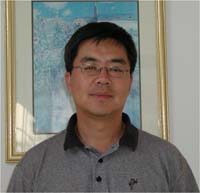Technology Applications Panel
PANEL 6: Linux for Networked CE Devices
IP Park
Moderator
I.P. Park is a Lead Scientist at Panasonic Information and Networking Technologies Laboratory in Princeton, New Jersey, U.S.A., where he directs research in operating system security and secure download technologies. Dr. Park is involved in various standards activities, including CE Linux Forum, Embedded Linux Consortium, Open Mobile Alliance, Software Defined Radio Forum, and Java Community Process. Prior to joining Panasonic, Dr. Park was an Associate Professor in the Department of Computer Science at New York Institute of Technology. He holds Ph.D. and M.S. degrees in Computer Science from Columbia University, and a B.S. degree in Computer Science from Seoul National University
Linux is an open source operating system, which is rapidly gaining popularity in the consumer electronics market. Linux based networked CE products have already been introduced by several CE manufacturers, including settop boxes, PDAs, and smart phones. There are several advantages of using Linux in the CE space. It is an open source operating system developed under General Public License (GPL), and the source code is freely available to everyone. Linux has been around for over a decade and is being developed and supported by numerous people. It is considered one of the most stable general-purpose operating systems that is supported by a vast number of software programmers. It supports most network protocols, has been ported to a wide variety of processors, and the entire source code is available for everyone to use and to modify. However, there are downsides of using Linux in the consumer electronics space as well. Linux has its origin in the desktop and server spaces, and therefore it is not optimized for use in CE products. In order for Linux to be useful as an operating system for CE products, functional enhancements must be made in areas such as memory footprint, response time, power management, security, and reliability. Furthermore, FUD (Fear, Uncertainty, Doubt) is preventing a more aggressive penetration of Linux in the CE market. One of the most important issues that have not yet been fully tested is the use of GPL, which is a copyright license and is silent on patent licensing. This panel discussion will bring together representatives of the entire CE Linux value chain, including CE manufacturers, embedded Linux vendors, and the Linux community to discuss the future of Linux in the CE market.
